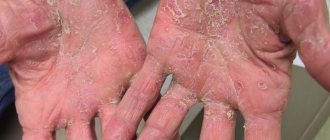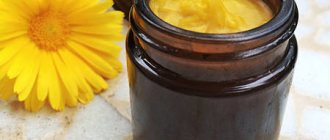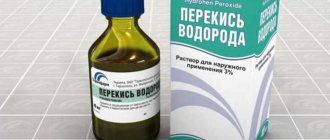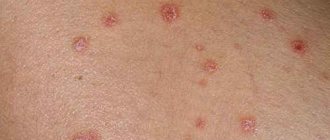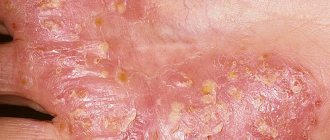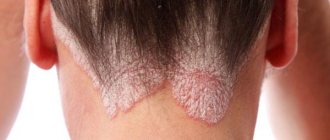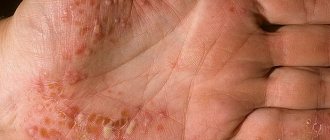Psoriasis is a non-contagious skin disease that manifests itself as papular rashes covered with shiny, silvery scales. The process involves the skin, joints and nail plates.
Medicine for psoriasis should be selected by a dermatologist after examining the skin, questioning and examination. Self-treatment can lead to complications.
Non-hormonal drugs
Non-hormonal agents are used in the treatment of this disease. These can be ointments, gels, creams, tablets, shampoos, capsules and solutions. At first, it is better to use products for external (local) use. If they are ineffective, systemic medications are prescribed. When choosing a drug, the following are taken into account:
- form of psoriasis (simple plaque, exudative or pustular);
- severity of the disease;
- localization of rashes (on the head, nails or skin);
- presence of complications;
- individual patient tolerance to the components of the drug;
- contraindications;
- patient's age.
For psoriasis on the head
In case of formation of psoriatic plaques on the scalp, the following non-hormonal medications are effective:
- Medicinal shampoos (Skin-Cap, Nizoral). Skin-Cap has antiproliferative (suppresses excessive cell proliferation) and anti-inflammatory effects. The active ingredient is activated zinc. Contraindication is individual intolerance. Shampoo for psoriasis should be applied to damp hair. After this, you need to rinse them and apply the medicine again. Skin-Cap does not affect the condition and color of the hair.
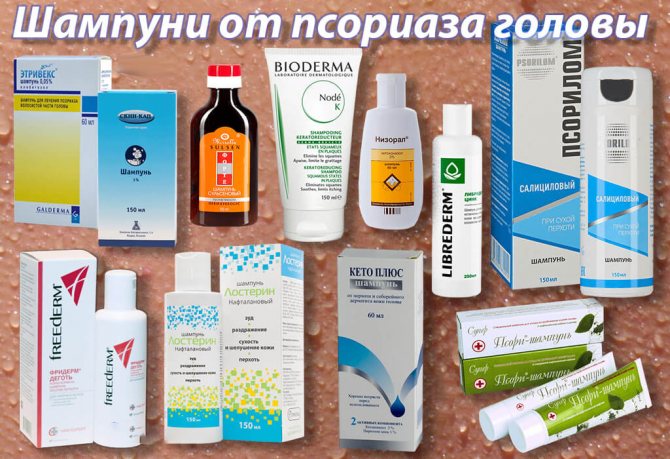
- Salicylic ointment. The mechanism of therapeutic action is associated with the normalization of the process of keratinization of the skin in the scalp area. In high concentrations, the drug has a keratolytic effect (softens the skin). Salicylic ointment is not prescribed for children or those who are intolerant to the medication. When using the product, undesirable effects such as rash, burning and itching are possible.
- Antihistamines (H1-histamine receptor blockers). They are indicated in case of itching due to psoriasis, which is rare. The following drugs are used: Fenkarol, Diazolin, Suprastin, Ebastine, Kestin, Cetrin, Zodak, Zirtek, Xizal, Glenset, Elcet and Suprastinex.
- Homeopathic remedies (Psoriaten, Psorilom).
Additionally, vitamin complexes (Kombilipen, Milgamma) may be prescribed.
Skin products
For psoriasis of exposed skin areas, the following medications are used:
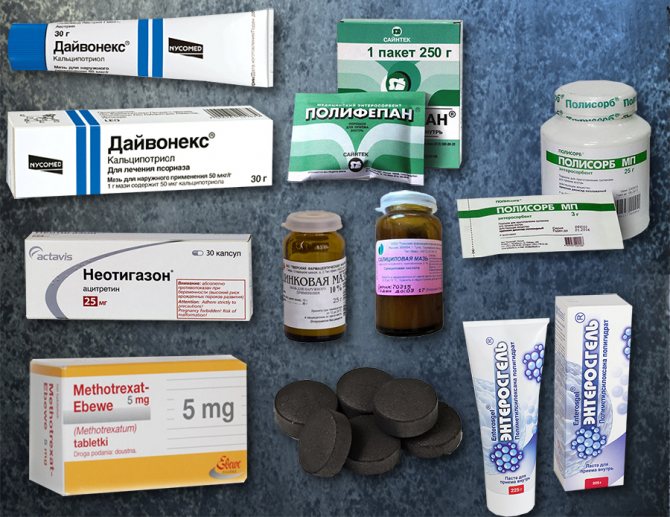
Synthetic analogues of vitamin D (Glenriaz and Daivonex). These drugs are used in the form of solution, ointment and cream for external use. Glenriaz ointment affects the proliferation of skin epithelial cells. This drug is not recommended for use on the face.- Retinoids (vitamin A analogues). For psoriasis, Neotigazon is prescribed. It affects the process of maturation of cells of the surface layer of the skin and eliminates disruption of this process. The drug is used in the form of capsules for oral administration. Neotigazon is prescribed for severe forms of the disease (generalized pustular, erythroderma).
- Zinc and salicylic ointments.
- Cytostatics (Methotrexate). The drug inhibits the growth and reproduction of skin cells. Methotrexate is prescribed for severe psoriasis when local medications do not provide the desired effect.
- Antibiotics. Indicated for the development of purulent complications against the background of pustular psoriasis.
- Sorbents (Polyphepan, Polysorb, activated carbon and Enterosgel). They help remove toxic substances from the body and speed up recovery.
Psoril. Description of the medicine
The medicine for a skin disease such as psoriasis is a homeopathic remedy that has proven itself to be the best - it practically does not cause side effects or contraindications due to its natural composition. It is very convenient to use because it is produced in the form of shampoo, spray, cream and tablets. Each of them is prescribed by the attending physician depending on the specific case. Let's take a closer look at the release forms of the drug.
Psoril. Shampoo
There are such varieties of Psoril shampoo as tar and salicylic, and how each of them works for psoriasis and some other skin ailments can be read in people's reviews. They contain natural ingredients that have a beneficial effect on lesions of skin cells.
The medical product listed first consists of:
- birch tar, which has excellent disinfectant properties, which is necessary to prevent the progression of the disease and the addition of bacterial infections;
- extracts of St. John's wort, which has an antimicrobial effect, and also relieves inflammation and soothes the irritated surface of the dermis;
- celandine extract perfectly cleanses the scalp of impurities;
- sequence, eliminates inflammation.
This product is intended for patients with skin prone to oiliness, because tar dries it out.
In turn, salicylic shampoo includes the following active substances:
- zinc pyriotin, which has bactericidal properties;
- B vitamins that restore the damaged surface of the dermis;
- salicylic acid, thanks to its action, dead skin softens and comes off painlessly, and also creates a barrier that protects healthy skin from infection;
- biotin – helps grow healthy hair;
- chamomile extract – has excellent antimicrobial and soothing properties.
Psoril. Pills
Treatment for psoriasis with Psoril granules or tablets is selected by the dermatologist individually (depending on the degree of the disease), while the forums contain a lot of laudatory reviews from people about each of these forms. Each of these medications contains the same components. The therapeutic effect is achieved due to the action of such natural components as:
- Barberry, the medicinal properties of which are to eliminate the discomfort caused by the disease: burning, severe itching, and also reduces the amount of psoriasis rash from the surface of the dermis.
- Extract of poisonous climbing plants of the Sumacaceae family reduces various types of rashes.
- Potassium bromate - used to reduce flaking and improve skin regeneration.
- Goldenrod – has a general therapeutic effect on the surface of the dermis, reduces side effects.
Psoril. Cream
The attending physician usually prescribes Psorilom cream for the treatment of psoriasis as an external remedy, the effectiveness of which has been scientifically proven and confirmed by many positive reviews. The medication contains zinc pyriotin, which is one of the important components in the fight against various types of skin diseases.
It has an antimicrobial effect and reduces inflammatory processes in damaged skin areas. In addition, the product contains healing plant extracts that regenerate the disease-causing surface of the dermis, resulting in the restoration of human skin.
Hormonal agents
The course of therapy for psoriasis includes the use of hormonal drugs (local or systemic corticosteroids). If a person has lichen planus, then medications based on prednisolone, betamethasone, hydrocortisone and triamcinolone can be used.
For the scalp
For scalp psoriasis, foreign and Russian external preparations in the form of lotions are used. These include Elokom, Momederm, Diprosalik and Belosalik. The solution is applied to the affected skin and rubbed in a little. The active ingredient in Elokom is mometasone. The drug has an anti-inflammatory effect, reduces the processes of granulation and tissue infiltration. Momederm is used for itching and inflammation of the skin due to psoriasis. The drug is prescribed to patients over 2 years of age.
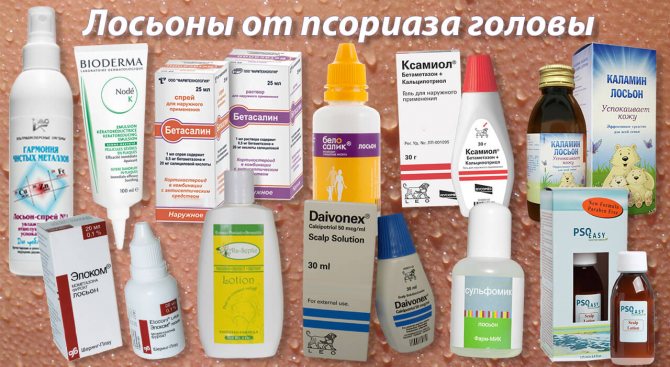
Contraindications are infectious diseases (skin tuberculosis, syphilis, acne, drug intolerance, pregnancy and lactation, post-vaccination reactions).
Complex drugs include Diprosalic. It contains betamethasone and salicylic acid.
For the treatment of skin
Modern remedies used for skin lesions due to psoriasis include:
- Hydrocortisone.
- Prednisolone.
- Polcortolon.
- Kenalog.
- Lokoid.
- Laticort.
- Dexamethasone.
- Methylprednisolone.
Tablets for psoriasis are prescribed only in severe cases.
Treatment with hormonal medications
This type of medication is used for severe illness. Hormones help improve the patient’s condition, but their effect is short-lived.
Hormones can be used both in the form of tablets and in the form of ointment. Most often you can find drugs that contain hormones in the form of an ointment.
Psoriasis medications that contain hormones may cause problems:
- With liver.
- With kidneys.
Another negative effect that is caused by the use of products that contain hormones is a high probability of addiction.
In addition, for psoriasis, hormonal-based ointments are very widely used, additionally containing:
- Triamcinolone.
This remedy is characterized by antiallergic and anti-inflammatory manifestations. In addition, it eliminates the itching sensation. Despite these advantages, this component can cause skin irritation and the development of eczema.
With long-term use of drugs based on it, the risk of atrophic skin lesions increases.
- Flumethasone.
This substance helps fight the disease and has an antipruritic, anti-escudative effect on the body. In addition, it eliminates the symptoms of allergic skin manifestations. If used incorrectly, the substance provokes itching.
- Hydrocortisone.
This is a new remedy designed specifically to treat psoriasis. It is responsible for suppressing the accelerated growth of connective tissue in most affected areas. With prolonged use, it can provoke the occurrence of systemic disorders.
- Betamethasone.
This substance fights psoriasis, eliminates its symptoms and has an anti-inflammatory effect on the body and reduces the level of vascular manifestations.
Immunomodulators
For psoriasis, immunomodulators (immunostimulants and immunosuppressants) are widely used. For psoriasis, including the arthropathic form of the disease, Likopid can be prescribed. It comes in the form of tablets for oral administration. The active ingredient is glucosaminylmuramyl dipeptide. The drug must be taken before meals. The dosage is determined by the attending physician.
Polyoxidonium also belongs to immunomodulators. It is available in the form of lyophilisate, tablets and suppositories. The active ingredient is azoximer bromide. It regulates the functioning of the immune system, has anti-inflammatory and antioxidant effects.
Nutrition for psoriasis

Medical studies have proven that diet can significantly improve the condition of psoriasis patients. It maintains the acid-base balance and normalizes metabolism in the body through the food consumed.
The diet menu should be based on the following products:
- Greens: dill, parsley, lettuce.
- Berries: blueberries, lingonberries.
- Fish: salmon, salmon.
- Dairy products: cottage cheese, fermented baked milk, kefir, sour cream.
- Zinc-containing foods: liver, eggs, spinach.
- Vegetables: carrots, broccoli, zucchini, beets, asparagus.
- Cereals: buckwheat, oats, millet, oatmeal.
- Meat products: poultry, rabbit, beef.
If you have psoriasis, it is not recommended to eat fried, smoked, spicy and citrus foods. During an exacerbation, it is best to completely avoid sweets (cookies, candies, chocolate), soda, coffee, tomato juice and alcoholic beverages.
Example of a diet menu for 1 day:
- Breakfast: oatmeal on water with dried fruits, herbal tea from chamomile or rose hips.
- Afternoon snack: baked apple.
- Lunch: vegetable soup, steamed chicken breast, dried fruit compote.
- Dinner: vegetable salad with herbs, steamed fish, chamomile tea or water.
Before drawing up a dietary menu, you should consult your doctor. It will help you create a more correct weekly menu for your diet.
Immunosuppressants
Most often, medications that suppress immune reactions (cytostatics) are used for psoriasis. These include:
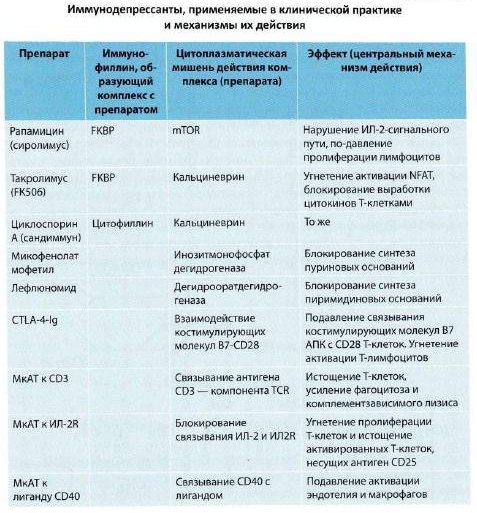
Methotrexate-Ebewe. Used in the form of injection solution, tablets and concentrate. It is an analogue of folic acid. The mechanism of action is associated with suppression of the activity of immune cells. The medicine is contraindicated in case of intolerance, renal and liver failure, anemia, decreased leukocytes and platelets, during pregnancy and lactation.- Preparations based on cyclosporine (Cyclosporin Sandoz, Sandimmune Neoral, Ecoral, Panimune Bioral). These drugs selectively act on T-lymphocytes, suppress humoral and cellular immunity and disrupt the production of lymphokines without affecting the formation of phagocytes. Cyclosporine-based drugs are prescribed for resistance to other drugs.
- Antirheumatic drugs (Arava, Leflunomide, Lefomid). These drugs are indicated for patients with psoriasis complicated by arthritis (inflammation of the joints). Arava is contraindicated in cases of liver dysfunction, severe infections, immunodeficiency, renal failure, intolerance, low blood protein levels, during pregnancy and lactation. The drug is prescribed only to adults.
- Tumor necrosis factor inhibitors (Enbrel, Infliximab, Remicade, Flammegis). Enbrel is available in the form of lyophilisate and solution for injection. The drug is used for the treatment of severe and moderate psoriasis in adults when it is impossible to use Methotrexate and Cyclosporine. Enbrel may be prescribed to children over 8 years of age with severe disease.
- Esters of mycophenolic acid (Mycophenolate Mofetil, Supresta).
- Thymodepressin. Available in the form of nasal drops, solution for intramuscular administration and spray. The drug suppresses the cellular and humoral components of immunity, reduces the number of helpers and suppressors.
- Azathioprine. Belongs to the group of antimetabolites. The drug suppresses the processes of cell proliferation and cell division. The mechanism of immunosuppressive action is associated with the effect on cytotoxic activity and delayed-type hypersensitivity reactions. The drug is not prescribed to pregnant women and people intolerant to cyclosporine.
Desensitizing and detoxification treatment
Hyposensitizing therapy with calcium preparations reduces the sensitivity of the body by stabilizing cellular structures and reducing capillary permeability
It is carried out for severe forms of the disease. Desensitizing agents thicken cell membranes and reduce vascular permeability, reduce inflammation and reactivity of the body. Injections of calcium preparations are prescribed: calcium gluconate is injected intramuscularly, calcium chloride is injected intravenously. The full course of treatment is 10–15 injections. Injections are carried out daily or every two days.
Topical corticosteroids
For psoriasis, the following effective and inexpensive ointments from the group of GCS (glucocorticosteroids) are used:
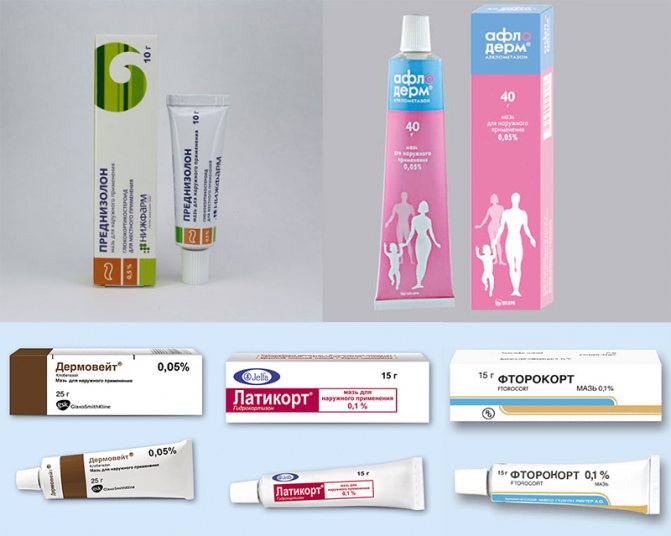
Prednisolone. The drug inhibits the work of tissue macrophages and leukocytes, reduces capillary permeability, inhibits the synthesis of prostaglandins and leukotrienes and suppresses the synthesis of antibodies. The medicine has a strong anti-inflammatory effect. This ointment can be used from 2 years of age.- Afloderm. The active ingredient is alklometasone dipropionate. It has antiproliferative, antipruritic and anti-inflammatory effects. You need to use the ointment 2-3 times a day.
- Dermovate. Contains clobetasol propionate. The ointment is used for all forms of psoriasis, with the exception of common plaque psoriasis.
- Laticort. The active ingredient is hydrocortisone butyrate. The ointment can be used in early childhood (suitable for children over 6 months).
- Fluorocort. The composition includes triamcinolone acetonide, which inhibits the migration of macrophages, reduces exudation (important in the exudative form of psoriasis) and the concentration of cytokines. All this leads to a decrease in the severity of tissue proliferation and infiltration.
The following ointments are no less effective for psoriasis:
- Triacort.
- Cloveit.
- Sinaflan.
- Flucinar.
- Synoderm (indicated for extensive psoriatic plaques).
- Lorinden A (combined drug).
- Akriderm.
- Betlieben.
- Celestoderm-B.
- Betamethasone.
- Beloderm.
Types of tablets for psoriasis
The capsule medications prescribed to patients are easy to use and do not require hospitalization. They are taken at home according to an individual regimen, which doctors develop based on the general condition of the patient and the degree of neglect of the pathological process.
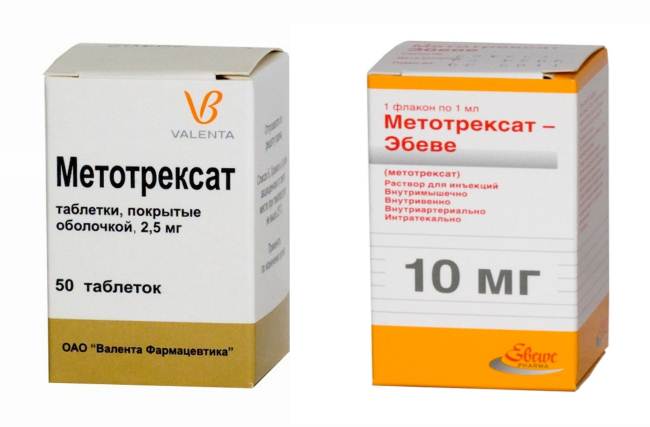
Let's look at the types of tablets that help cure psoriasis.
Fumaderm
The drug from a German manufacturer is quite expensive - about 27 thousand rubles.
It contains fumaric acid, which heals the body within 1.5 months of therapy.
Patients who treated psoriasis with Fumaderm write in reviews that the signs of the disease literally disappear. The drug demonstrates especially good results in combination with phototherapy and vitamin D supplements.
Side effects of Fumaderm are nausea, itchy skin, abdominal pain, and vomiting. The risk of developing negative reactions is minimized by fresh milk - you simply wash down the tablets with it.
Neotigazon
It’s also not a cheap product, because its cost reaches 2,500 rubles. Neotigazon is effective for complicated skin psoriasis, when other medications remain poorly effective. On the first day, these tablets are taken at a dosage of 35 mg. Gradually it is increased to 10 mg, lowering the amount by 10 mg each time.
They are treated with it for 4 months, in between using folk remedies against psoriasis and attending phototherapy sessions. If adverse reactions bother the patient too much, the drug is replaced with analogues - Acitrin or Psorcutan.
Psoril
Psorilom has immunomodulatory properties. Take it 3 times a day, 30 minutes before meals.
The second option is to eat and take a pill an hour later. This is an effective auxiliary product that goes well with ointments, sprays, gels and specific shampoos for psoriasis of the scalp.
An integrated approach prevents the development of other skin pathologies and promotes the healing of lichen areas.
Methotrexate
The Russian-made drug is available to a wide range of consumers - its price starts at 200 rubles per package. The task of Methotrexate in the treatment of psoriasis is to inhibit skin proliferation, which leads to a reduction in peeling, as well as to stabilize the process of cell division.
Methotrexate tablets are taken twice a day for 1 week, 5 mg at a time. From day 8, a week-long break begins, then therapy continues.
During the period of remission, Methotrexate is taken 1 time in the amount of 2.5 mg.
The course of treatment is 10 days or more, this is decided by the doctor. Often this medicine is combined with Karsil and Prednisolone - hormonal medications.
Methotrexate is a useful and at the same time harmful drug. It should be used carefully, avoiding provoking the body to erythroderma or rheumatoid arthritis.
Abuse of the tablets in question for psoriasis is fraught with cystitis, dental disorders, kidney disease, headaches, gastrointestinal dysfunction, as well as changes in the condition of the liver and bone marrow.
In hospital settings, in consultation with the doctor, Methotrexate is replaced with Cyclosporine-A. For treatment, this drug is used for no longer than 2 months.
Lamisil
The remedy is an additional method of therapy if the disease has a fungal etiology. Lamisil is prescribed for fungal infections on the nails, mucous membranes, and scalp.
If for any reason the body does not accept the drug normally, the patient is offered analogues - Exifin, Atifin, Fungoterbin, Binafin and other antimycotics.
Lycopid
Immunomodulatory medications for psoriasis are good because they stop inflammatory processes in the body. Likopid tablets are one of these drugs. They do not cause serious side effects, but at the beginning of use it is possible that the body temperature may rise to 38 °C.
Drink Likopid 2 tablets per day for exactly 10 days. Then they take a break for 24 hours and resume therapy, but 1 piece at a time. Lykopida. Again, treatment lasts 10 days. Advanced psoriasis is treated continuously for 3 weeks.
This drug is not prescribed during pregnancy, lactation, or autoimmune disorders. If itching, swelling and rashes increase, stop taking the pills and immediately consult a doctor. According to the doctor’s decision, therapy is continued with Bronchomunal, Romurtide, Viferon or Isoprinosine.
Biological drugs
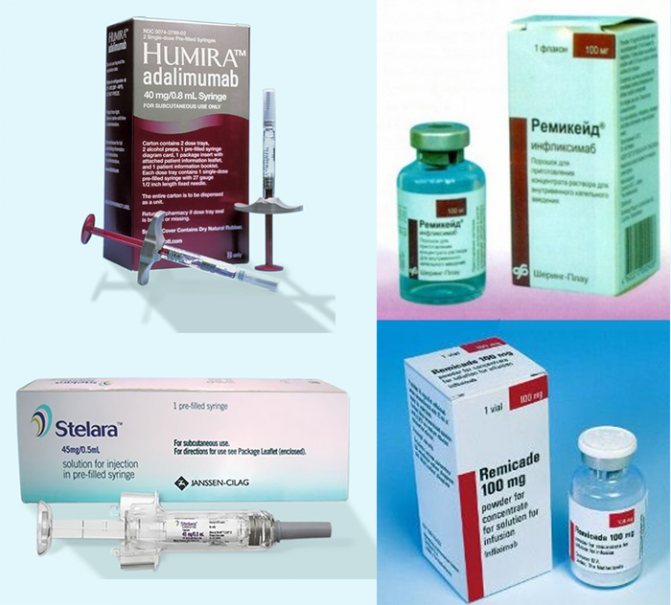
Biologic drugs prescribed for psoriasis include cytokines and monoclonal antibodies. The latter are immunoglobulins obtained from immune cells. These substances bind protein molecules that affect the functioning of T-leukocytes. Monoclonal antibodies block cytokines responsible for immune responses. The result is inhibition of cellular processes that occur in psoriasis.
Monoclonal antibodies have found use in the treatment of severe and moderate psoriasis. The disadvantage of these biological drugs is their high cost. Monoclonal antibodies include Humira (used for chronic plaque psoriasis when basic therapy is ineffective or impossible), Infliximab, Remicade and Stelara.
Treatment methods for psoriasis

Before you begin treatment for psoriasis, you should remember that it is impossible to completely recover from this disease. All available treatment methods are aimed at eliminating symptoms, strengthening the immune system, and transferring the disease into remission. The choice of treatment method depends on the severity of the disease.
There are 5 methods used to treat psoriasis:
- Drug treatment involves the use of medications of various groups for external and internal use.
- Treatment with physiotherapeutic procedures - this includes various irradiations of the skin with ultraviolet rays.
- Surgical treatment is the most painful and risky treatment method; it involves removing the upper layers of the affected skin. The effectiveness of this method is 85%. According to statistics, it only applies to every 10,000 patients.
- Diet therapy - with this method, the patient is prescribed various diets that are aimed at generally strengthening the body, increasing its immunity, and eliminating various food irritants.
- Treatment with traditional medicine - during this method of treatment, the patient is prescribed various decoctions, infusions, and oils. It is immediately worth noting that traditional medicine is only an addition to drug treatment.
The choice of method and medications for treatment is made exclusively by the doctor. He selects the optimal method of therapy, taking into account the individual characteristics of the body and the results of the patient’s examination.

